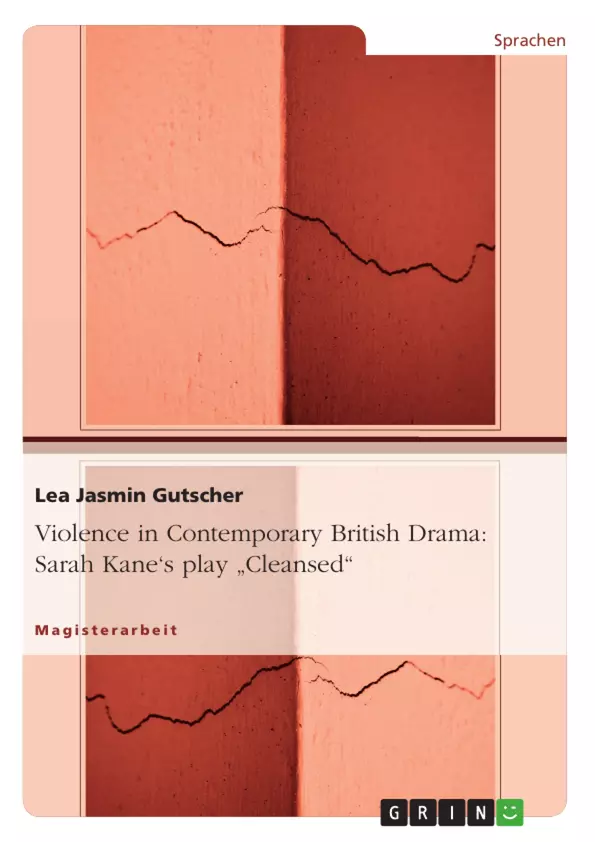When Sarah Kane, born in 1971 in Essex, England, committed suicide at the age of 28 in February 1999, she left five plays and the script for a ten minute screenplay. Kane had dedicated much of her short life to the understanding, exploration and (re)invention of drama.
While still at school she started writing and acting, activities which she continued at university, where she further experimented with theatre and where she also took up directing. After leaving the University of Bristol with a First Class Honours Degree in drama studies, she enrolled at Birmingham University and crowned her education with a Master’s degree in playwriting. After several minor dramatic experiments, staged as student productions in unofficial venues, her first full-length play, Blasted, premièred at the Royal Court Theatre in London in January 1995.
The play immediately became notorious for its depiction of all kinds of physical and verbal violence for which it was fiercely attacked by both public opinion and reviewers. The fact that the plays which followed contained many unspeakable scenes of sheer cruelty, earned her the reputation as the enfant terrible of contemporary British drama. During her brief career Sarah Kane created a body of work that brought her both success and notoriety. Her controversial theatre divided critics and audiences from the beginning. While some attacked her persistently, others recognised her as a new voice, and after she explored and discovered different linguistic and theatrical devices, critical approval followed.
Table of Contents
- Introduction
- The theatrical background
- Sarah Kane's dramatic art
- Kane's writing: similarities and points of difference in her plays
- The interaction between realism and surrealism
- The art of reduction
- A critical analysis of Cleansed
- Form and content of the play
- Themes
- Love
- Identity
- Sexual identity
- The incongruity of body and soul
- Language
- The word "lovely"
- The struggle with language
- The powerlessness of language
- Imagery and symbolism
- The element of flowers
- The element of light
- The image of blindness
- The use and function of violence
- Influences on Kane and her treatment of violence
- Physical violence
- Self-mutilation and suicide as extreme forms of physical violence
- Verbal violence
- Words as weapons
- The spectator's role
Objectives and Key Themes
This study examines the use of violence in Sarah Kane's play Cleansed, analyzing its significance within the context of her overall dramatic oeuvre. The aim is to explore the various forms and functions of violence in Kane's work, particularly focusing on the interplay of physical and verbal violence, and its metaphorical implications.
- The nature and function of violence in Sarah Kane's plays
- The relationship between violence and themes of love, identity, and language in Cleansed
- The impact of violence on the audience's experience and the role of the spectator
- The metaphorical use of violence as a means of exploring complex psychological and emotional states
- The influence of other dramatists on Kane's treatment of violence
Chapter Summaries
The Introduction provides an overview of Sarah Kane's life and work, highlighting her controversial approach to theatre and her distinctive style. It also sets the stage for the study's central question: the purpose and meaning of violence in her plays.
The theatrical background section explores the context of Kane's work, examining the trends and influences that shaped the landscape of British drama in the 1990s.
The chapter on Sarah Kane's dramatic art delves into her unique writing style, exploring the ways in which she blended realism and surrealism, employed the art of reduction, and challenged traditional theatrical conventions.
The chapter focusing on Cleansed provides a detailed analysis of its form, content, and themes. It examines the play's exploration of love, identity, and language, highlighting the complex interplay of violence in these themes.
The chapter on the use and function of violence in Kane's work delves into the specific forms of violence depicted in her plays, exploring the influences on her treatment of this subject and examining the motivations behind the use of physical and verbal violence.
Keywords
Violence, British drama, Sarah Kane, Cleansed, love, identity, language, metaphor, theatre, realism, surrealism, spectator, shock value, cruelty, theatrical conventions, In-Yer-Face Theatre.
- Quote paper
- Magistra Artium Lea Jasmin Gutscher (Author), 2007, Violence in Contemporary British Drama: Sarah Kane's play "Cleansed", Munich, GRIN Verlag, https://www.grin.com/document/118141



